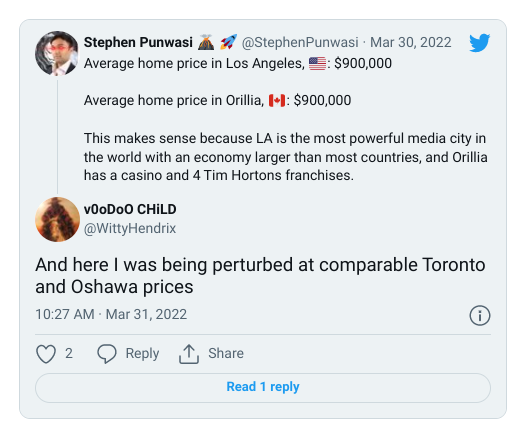Canada’s Housing Crisis
This post will start with another eye-rolling ‘I’m not an expert’ statement, but like Seinfeld, I can at least apply what I DO know and will speak to the absurdities that I’m witnessing.
We are being lead by developers and politicians that profoundly believe the expression “if you build it they will come“.
Of course, ‘they’ (as in people that need affordable housing) will. But we’ll never build affordable housing when the average house price remains at nearly a million dollars all through Canada.
People like Doug Ford and now Chrystia Freeland et al firmly believe that plowing everything over, increasing density and being very liberal with permits will help make housing more affordable and abundant, therefore stemming the price increases we’ve been witness to over the last four decades.
FFS, people are laughing and mocking Canada by comparing house prices in LA to Orillia. The quote being:

Housing prices will continue to escalate. Not because every Joe and Jane in Canada are clamouring for a house – but this is part of the problem – but because of external factors that are artifically inflating the market (this is where I actually AM an expert, being trained as an economist), including the following:
- Foriegn investment companies that continue to plow money into real estate, especially residential properties, in Canada. Blackrock, Vanguard and other pension and investment fund companies are sinking unprecedented dollars into our homes and are converting them into rental units or shopping malls. Did we learn nothing about Pottersville in ‘It’s A Wonderful Life’?
- International students. The university model is fundamentally flawed and administrators have been going after international students for decades, but only recently have we really begun to feel the pinch and impact of this approach to higher education. Smaller markets like Kingston and London have become rental havens and student ‘ghettos’, cutting out supply from people that actually live in Canada ‘full time’.
- Short-term rental services like AirBnB. These companies are a relatively new phenomenon and have been indirectly encouraging people to take what they own in popular downtown cores (eg. Toronto, Montreal, Vancouver) and convert them into short-term rentals. While the positive impact on tourism trade and restaurants can be felt, the negative impact is that you don’t have ‘full time’ citizens inhabiting your neighbourhoods. This has profound tax implications because city coffers may be filled with property taxes, but the provincial and federal governments lose money because these properties are now being operated as businesses – including the deductions that come with them – with a net universal loss to government revenue.
- Rentals as investments. Many other people are just avoiding selling their ‘starter home’ and are renting instead. It’s a smaller version of the previous points, but a contributing factor to rising prices nonetheless.
- Dark money. Canada is one of the most stable political environments in the world. Dark money – crime-related, drug money that needs laundering, etc – is finding its way into the vacant spaces in our cities and is contributing to a massive depreciation of our downtown areas and suburbs as vacant areas leapfrog from one community to the next.
- Poor planning related to vacant spaces, urban development and sprawl. Related to the previous point. Try to picture some malls, vacant spaces and whether or not they sit on the market for long. Some of the small towns I mentioned earlier have had vacant spaces for years, resulting in empty or rotten downtown cores. Better planning would eliminate real estate ‘squatters’ and convert these properties into productive land.
(As a side-note on vacant property. If we were serious about this, we’d have a simple rule: you’ve got 24 months to make something of this property. If you don’t use it for city-approved purposes (ie. rentals, business activities), you’ll be subject to a massive property tax payable immediately and not eligible for deduction as a cost of doing business. If property owners bail, we take possession of the building and assets and convert them to productive assets that our cities need. Example: food terminals, growing facilities, distribution centres, etc).
No amount of supply will reduce rents and stifle our exploding market.
All we’re going to do is destroy productive farm land and natural environments as well as line the pockets of developers everywhere across Canada.